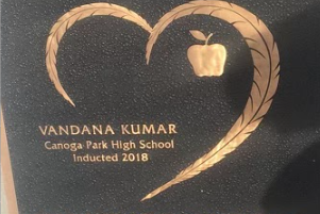In Loving Memory : World War II Veteran’s Efforts to Refurbish a Plaque at Garfield High Honoring His Brother and Others Lead to Plans for Annual Ceremony
- Share via
In June, around the time President Clinton was in Normandy (France) for the 50th anniversary of D-day, my sister reminded me of a plaque they had at Garfield with all the students and one teacher who died in World War II.
I didn’t remember the plaque, so I decided to go down there and take a look. I walked into the lobby and the plaque looked awful. It was dirty and cruddy and you couldn’t even read the soldiers’ names. It was just stuck on the wall with no decoration. I thought, “God almighty, nobody cares these people died for their country.”
I wrote a letter to the assistant principal at Garfield, Greg Vallone. The school asked the metal shop teacher if he knew how to remove the corrosion. Several students with toothbrushes and solvent helped clean the plaque.
Then I went to meet Mr. Vallone and that’s when he told me: “We’re going to have a ceremony. We’re going to have the ROTC. We’re going to have the band and we’re going to have the Marines.” He said, “From now on we’re going to have the ceremony every year.”
All I wanted them to do was keep the plaque clean, fix it up and put a little vase for flowers. This was more than I ever expected. Friends say, “You know, you have done something great,” but I’m just a regular Joe. It’s about time somebody took the initiative to do something about it. They deserve it.
I only knew about five of the students who died because they were older than me. But everybody was affected. Families were a lot closer back then.
My brother Ralph graduated from Garfield in 1943 and was gone only 10 months when my family got the letter that he had died at Normandy. He was only 19.
It was the worst times of our lives. I don’t know how much longer it was when they brought his body back and we had to go through the same turmoil again. Oh, God, everybody broke loose again and started crying. I think they should have left him there right where he fell.
Sometimes at night, I hope the guy didn’t suffer. I hope he just got it quick. You couldn’t go back because the ocean was behind you. You couldn’t go forward because those guys were shooting at you from the top of the cliff and spraying the beach. One of these days, I pray to get enough money to go to Normandy. They have tours and somehow I’m going to get there.
I fly the American flag outside my house all the month of August in memory of my brother’s birthday. I don’t like to go to the cemetery. It’s hard. There’s just a stone there with his name on it and a lot of other close friends of the family who died in the war.
When you were 18 you had no choice, the armed forces took you away. Guys who weren’t old enough were volunteering because they didn’t want to get left behind. I got drafted and was going overseas when Japan surrendered. I was one of the lucky ones; I encountered only small fire. We were ordered not to shoot back. I was fortunate.
Nobody wins in war. I don’t know who starts war but how can you not be angry when you lose your brother? About eight of our friends on the block we used to live on Mednik Avenue either died or were crippled. There’s one guy who has his legs all shot up and I think he has a wooden leg.
My brother had a lot of friends. Everybody liked him. I never really got to know him because he was with his friends and they didn’t hang around with me.
When we were kids, guys used to put on boxing gloves and punch around each other. They put me against my brother. He was never violent or anything. I was pretty good with my dukes and I beat him up.
When he left and I heard that he got killed, I said to myself: “I never apologized to him.” I wanted to somehow apologize to him for the beating that I gave him. Taking care of the plaque is sort of an apology.
More to Read
Sign up for Essential California
The most important California stories and recommendations in your inbox every morning.
You may occasionally receive promotional content from the Los Angeles Times.













